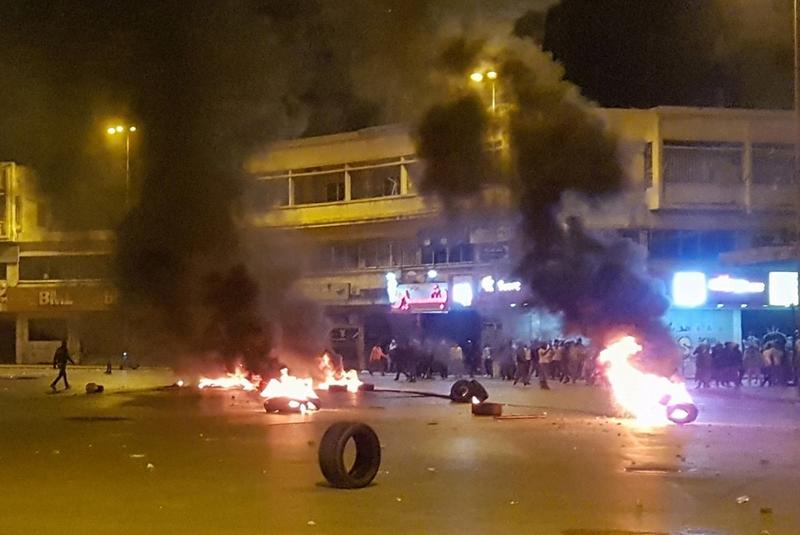 Lebanese anti-government protesters burn tyres amid clashes with security forces in the northern city of Tripoli late on April 27, 2020, following a demonstration over the country's deteriorating economy despite a coronavirus lockdown. (FATHI AL-MASRI / AFP)
Lebanese anti-government protesters burn tyres amid clashes with security forces in the northern city of Tripoli late on April 27, 2020, following a demonstration over the country's deteriorating economy despite a coronavirus lockdown. (FATHI AL-MASRI / AFP)
BEIRUT - Violent protests against growing economic hardship erupted again in the Lebanese city of Tripoli on Tuesday, with banks set ablaze after a night of rioting that left one demonstrator dead, according to security and medical sources.
Tripoli, a port city 80 km north of Beirut and long dogged by poverty and unemployment, was the stage for big protests against Lebanon’s ruling elite during widespread demonstrations last Oct
A collapse in the currency, soaring inflation and spiralling unemployment are convulsing Lebanon, which has been in deep financial crisis since October. A shutdown to fight the new coronavirus has made matters worse for the economy.
Overnight, protesters in Tripoli set several banks and an army vehicle on fire. Soldiers fired in the air and used tear gas and rubber bullets, a security source said. The man who died was in his 20s and it was not immediately clear who was responsible for his death, the source said.
ALSO READ: Lebanon factions form government, ending nine-month deadlock
Protesters returned on Tuesday, setting two banks on fire and smashing their facades, prompting the army to redeploy. Dozens of soldiers positioned themselves in a street lined with several banks, and some fired rubber bullets and tear gas to repel protesters.
Prime Minister Hassan Diab urged Lebanese to refrain from violence and said “malicious intentions behind the scenes” were “shaking security and stability”.
“We are faced with a new reality, a reality that the social and living crisis has made worse at record speed, especially with the rise of the US dollar exchange rate to record levels on the black market,” Diab said in a statement.
Lebanon’s battered pound, which has lost more than half its value since October, has slid sharply over the past week, triggering small protests despite a coronavirus lockdown and pleas by officials for people to remain home.
US dollars sold for 4,200 Lebanese pounds each on Tuesday according to one importer, despite a central bank directive capping the price at 3,200. Several currency dealers were arrested on Monday for violating the cap, prompting their trade association to announce an open-ended strike.
The unrest threatens to tip the country back into violence even as Beirut looks to pass an economic rescue plan and enter negotiations with foreign creditors after defaulting on its hefty debt obligations last month.
Warning
Tripoli, a port city 80 km north of Beirut and long dogged by poverty and unemployment, was the stage for big protests against Lebanon’s ruling elite during widespread demonstrations last October.
“This is not a riot, this is expressing (anger) that the dollar has reached 4,000 Lebanese pounds ... How are people going to eat? And this is the holy month of Ramadan,” said Abou Hussein, a Tripoli activist.
The army said that overnight a firebomb was thrown at one of its vehicles and a hand grenade was hurled at a patrol. It blamed the trouble on “infiltrators” and called on peaceful protesters to leave the streets.
It said 40 soldiers were wounded in Tripoli and elsewhere after patrols sent to reopen roads were attacked with stones. Three banks and several ATMs in Tripoli were burned overnight and nine protesters were arrested, a statement said.
The UN Special Coordinator for Lebanon, Jan Kubis, said the violence was a warning for Lebanon’s political leaders.
“This is the time to provide material support to increasingly desperate, impoverished and hungry majority of Lebanese all around the country,” he said in a tweet.
READ MORE: Concerns grow in Lebanon amid coronavirus pandemic
The banking association declared all banks in Tripoli shut until security is restored. Banks have been a target of savers angered by being frozen out of their deposits.
“We are surely heading to a much worse place ... If it is not solved with politics, this situation will surely keep on deteriorating,” said Samer Diblis, an activist from Tripoli.


